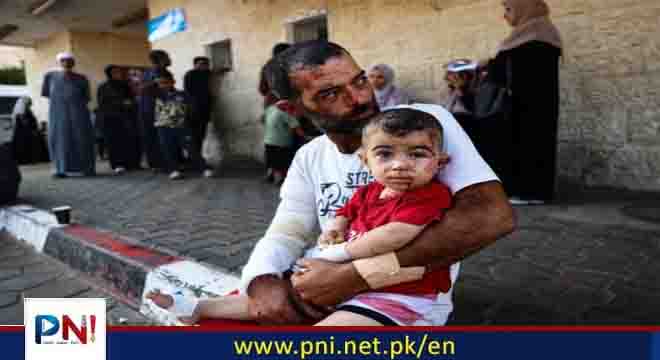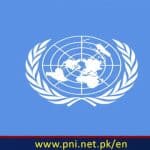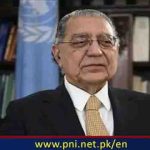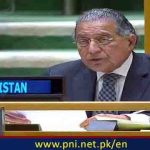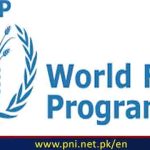UNITED NATIONS, Jan 24 : A top Pakistani diplomat has called for Israel to be held accountable for the crimes committed during its 15-month long war in Gaza, as he highlighted the suffering of Palestinian children that “stands out as a black mark on humanity at large.”
“Heinous crimes have been committed in this brutal war, particularly against children in violation of International Humanitarian Law, the Geneva Conventions, the Convention on the Rights of Child and the Convention on Genocide,” Ambassador Munir Akram, permanent representative of Pakistan to the United Nations, told the UN Security Council meeting on the dire humanitarian situation in Gaza on Thursday.
The meeting was held at the request of Russia, Pakistan, Somalia and Sierra Leone in an effort to focus on the plight of children in Gaza.
“Over 46,000 people killed — most of them women and children. How can this be justified?”, the Pakistan envoy asked.
“The suffering of children in Gaza stands out as a black mark on humanity at large, not only on those who caused the sufferings by their bombs and artillery, not only on those who allowed this to happen over 15 months that this Security Council remained frozen because of the positions of certain states, not only on those who continued to supply weapons and ammunition to the attacking forces who were killing children every day but even all of us,” he said.
Ambassador Akram denounced Israel’s deliberate policy of targeting civilians, irrespective of the fact that the majority being killed are women and children, attacking hospitals and schools, with snipers targeting children.
“What moral degradation allows something like that to happen?” he posed a question.
“There are complaints about 7th of October but compare that with the devastation that has been visited on the people of Gaza. Does 7th of October justify what has been done to the children of Gaza. Can it ever be justified?”
Welcoming the ceasefire brokered by Egypt, Qatar and the US, Ambassador Akram said it could have been achieved much earlier.
“Now we must ensure that the ceasefire holds and the Israeli threat of to resume the conflict are held back,” he said while voicing concern over the developments in the West Bank and urging the Security Council to take cognizance.
The Pakistani envoy underscored the need for accelerating humanitarian aid to the traumatized people.
“There is a risk of disease, water scarcity, scarcity of food, all of these requirements must be addressed. All borders crossings must be opened and UNRWA’s continued operation must be ensured by the international community and the Security Council.
“We will need every construction plan to be implemented immediately because the Palestinian people are being asked to return to their homes. But look at the homes, there are no homes. Everything has been devastated. Where will they go for shelter?
Ambassador Akram said that all these Israeli atrocities call for accountability to restore international legitimacy.
“We must try to ensure that such brutal slaughter of children never happens again,” the Pakistani envoy said in conclusion.
Earlier, UN Emergency Relief Coordinator Tom Fletcher told the 15-member Council: “Today marks one of the rare times we are able to highlight positive developments, albeit amid catastrophic humanitarian needs in Gaza.”
He noted that the recent ceasefire has provided a much-needed reprieve from relentless hostilities, allowing for a surge in life-saving humanitarian aid.
However, Fletcher did not shy away from detailing the harrowing experiences of Palestinian children over the past 15 months. “Children have been killed, starved, and frozen to death.
“They have been maimed, orphaned, or separated from their family,” he stated, adding that over 17,000 children are currently without their families in Gaza.
The situation for pregnant women and new mothers is equally dire, with an estimated 150,000 in desperate need of health services. “Some children died before their first breath – perishing with their mothers in childbirth,”. Fletcher lamented.
Education has also been severely impacted, with many children losing their schools and struggling to access necessary care for chronic illnesses. “Many have faced sexual violence,” Fletcher revealed, highlighting the additional indignity faced by girls who lack access to menstrual care.
According to UNICEF, one million children in Gaza are in need of mental health and psycho-social support for depression, anxiety, and suicidal thoughts. “A generation has been traumatized,” Fletcher declared.
Despite these challenges, the ceasefire has allowed humanitarian organizations to step up their response. “Safe, unobstructed humanitarian access, alongside the absence of hostilities and the almost complete cessation of criminal looting, have significantly improved our ability to operate,” Fletcher said.
In his closing remarks, Fletcher made three urgent appeals to the Security Council: to ensure the ceasefire is maintained, to uphold international law across the Occupied Palestinian Territory, and to secure funding for humanitarian operations.
“Our 2025 Flash Appeal requires $4.07 billion to meet the needs of three million people in Gaza and the West Bank,” he stated, emphasizing that nearly 90 per cent of the funds are needed for Gaza.
“The children of Gaza are not collateral damage. They are as deserving as children everywhere of security, education, hope,” Fletcher concluded. “We must be there for them now.”
The Security Council also heard from Bisan Nateel, from Tamer Institute for Community Education, an organization that helps Palestinian children express themselves through artistic activities, who recounted the “very simple dreams” expressed in drawings by the children she worked with, who “dreamed of going back to school, of playing with friends, and of not hearing constant shelling”.
Instead, she said, they were told to go to the safe place in south Gaza, through a “so-called safe corridor” where their lives were under threat, forced to see bodies along the road, forced to walk as snipers targeted them. “
They arrived unable to say a word about the horrific sights seen in their displacement journey, to a safe area that was targeted,” Ms. Nateel said.
Displaying a drawing by a child named Gazi when he was in al-Mawasi refugee camp, in which he drew himself feeling well-fed, at home with his father, she said: “But Gazi lost his life, along with his father, when their tent was attacked.”
Also citing the case of a 12-year-old girl in north Gaza, who saw the remains of relatives “torn to pieces” outside her tent, she said that amidst the horror and violence, the children of the Strip forgot “what it means to live, to be hum
Follow the PNI Facebook page for the latest news and updates.


